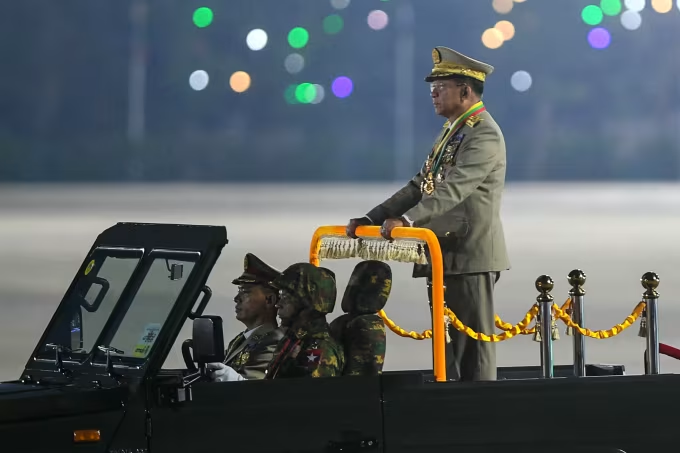Myanmar’s military regime on Thursday announced a nominal shift in power, forming a civilian-led interim government ahead of a long-promised election, while military chief Min Aung Hlaing remains firmly in control as acting president.
According to state media, a decree that had authorized the military’s rule since the 2021 coup was officially annulled, giving rise to a caretaker government and a special electoral commission tasked with preparing for the polls.
Despite the reshuffle, there is no substantive change in governance. Min Aung Hlaing, who led the coup that ousted Aung San Suu Kyi’s elected administration, continues to wield ultimate authority both as acting president and military chief.
The state of emergency, which had been extended seven times since the coup, expired on Thursday and has now been lifted.
Government spokesperson Zaw Min Tun confirmed the development, stating, “The interim president and commander in chief said this upcoming six months are the time to prepare and host the election.”
The country remains mired in conflict following the military’s seizure of power, which sparked a nationwide rebellion.
The junta faces accusations of extensive human rights abuses, which it denies, and continues to confront armed resistance across large parts of Myanmar.
Western governments have already dismissed the planned election as a farce, suggesting it is designed to cement military control.
Analysts expect the vote to be dominated by pro-junta candidates, as most opposition figures are banned or boycotting the process.
David Mathieson, an independent analyst focused on Myanmar, described the leadership shift as little more than a façade, “They are just rearranging the same pieces and calling the regime a new name,” he said. “This is part of preparations for an election which we don’t know much about.”
The feasibility of conducting elections in the midst of civil war remains in question. A census held by the junta last year was only completed in 145 of the country’s 330 townships, highlighting the military’s limited territorial control.
At a defense meeting on Thursday, Min Aung Hlaing revealed that elections would be staggered across regions in December and January, citing security issues, according to state broadcaster MRTV.
To manage unrest, authorities plan to enforce martial law and emergency rule in more than 60 townships across nine states and regions, many of them along the country’s volatile borders, where the army faces growing resistance.
China expressed its support for the junta’s latest move. A spokesperson from the foreign ministry stated that Beijing “supports Myanmar’s development path in line with its national conditions and Myanmar’s steady advancement of its domestic political agenda.”
Since the 2021 takeover, Myanmar’s military has been accused of killing over 6,000 civilians, detaining more than 20,000 people arbitrarily, and displacing 3.5 million others, according to a January report from Amnesty International.
The junta has rejected these figures and dismissed the allegations as fabricated by Western powers.
It maintains that the coup was necessary to address electoral fraud in the 2020 general election, claims that have been discredited by independent election observers who found no evidence of fraud that could have altered the result.
